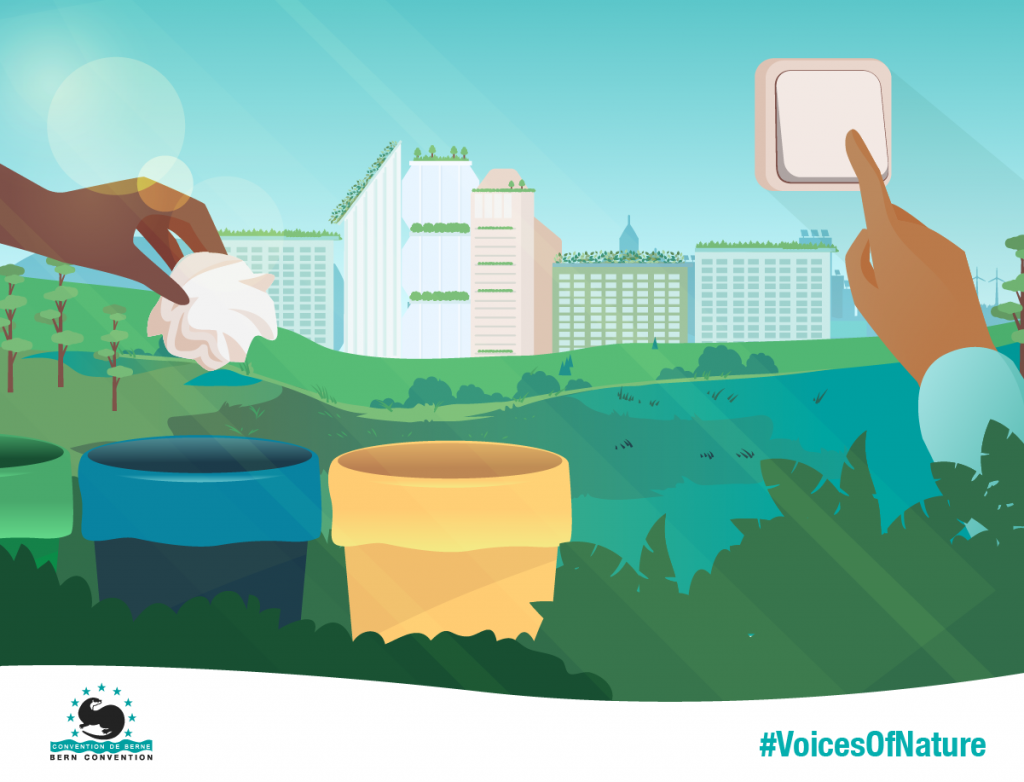For the Council of Europe (CoE), environmental sustainability is considered in internal operations and external projects alike. Although increasingly important in most fields, sustainability has been made a priority in the youth sector at an extraordinary pace. “Young people have taken this work on themselves, but we need to include all actors,” says Lana Pasic from the partnership between the Council of Europe and the European Commission in the field of youth.
In 2019 the Council of Europe signed a charter on promoting biodiversity with the city of Strasbourg where it’s located. From refraining from the use of chemical products to establishing havens for biodiversity and green façades, the CoE is currently implementing six of the thirteen criteria for managing green spaces listed in the charter, with three further measures being currently set up.
Under a new agreement signed on July 2021, the Council of Europe and the City of Strasbourg pledge to carry forward their joint thinking and to make Strasbourg a testing ground for innovative local policy. The Secretary General of the Council of Europe and the current mayor of Strasbourg, Jeanne Barseghian, agree that it’s important for the Council to show an example to others, particularly on the topic of green transition and environmental issues.
“It’s important for the Council of Europe to show an example to others, particularly on the topic of green transition and environmental issues.”
In addition to committing to the Biodiversity Charter and taking daily steps towards a greener institution – by sorting waste, saving energy, avoiding the use of non-recyclable containers, and reducing the amount of printing, among other actions – the Council of Europe has throughout the years developed several legal standards to strengthen environmental justice in its signatory countries.
Examples of such standards developed by the Council include the European Convention on Human Rights, the European Social Charter and the Bern Convention on the Conservation of European Wildlife and Natural Habitats, which all aim to make progress on environmental issues, with regards to pollution, technological or natural disasters, or access to environmental information, among other aspects.

An inherently climate-conscious generation
Another successful case example of sustainable action at the organisational level comes from the youth sector. Young people are in many ways inherently conscious of the need for sustainability, particularly in relation to climate change, as it will have direct impacts on the younger generations’ lives. This awareness is closely considered at the Youth Partnership, a project jointly funded by the Council of Europe and the European Commission.
The aim of the Partnership is to support and implement the priorities of its two partner institutions. It works at the interface of youth research, practice, and policy.
“We work with researchers and practitioners to gather knowledge and evidence to inform policymakers regarding different topics. When the Youth Department of the Council of Europe decided to work on greening the youth sector, they reached out to us to help them find existing research or do this research ourselves, so that they could make informed decisions,” says Lana Pasic, Youth Research and Policy Officer at the Youth Partnership.
Regarding climate action and sustainability, the Partnership provides research and information to policymakers on how they can best support the youth sector in acting sustainably. The Youth Partnership has also developed materials to help youth organisations to organise sustainable activities.

Lana Pasic
Youth Research and Policy Officer at the Youth Partnership
A recent piece of research conducted by the Partnership deals with the greening of the youth sector. It resulted in a for planning youth activities in a sustainable manner, with recommendations ranging from catering to venue selection and transportation.
From individual responsibility to institutional commitment
According to Pasic, reactions to the Youth Partnership’s work on sustainability have been extremely encouraging, both from institutions as well as young people themselves. “We’ve received very positive feedback from youth organisations. They feel that this commitment has been missing at the institutional level until now, and they are eager to contribute to our work.”
“Young people shouldn’t be the only ones responsible for making sure that sustainability becomes a key part of our lives.”
Youth activism and climate strikes have at the least made it clear that the younger generations are taking responsibility for the current situation, but more institutional action is also needed.
“Change in terms of sustainability and climate action cannot happen only by young people not eating meat or buying plastic bottles – we need a holistic approach that includes all actors. The climate crisis directly impacts young people’s lives, but they shouldn’t be the only ones responsible for making sure that sustainability becomes a key part of our lives.”